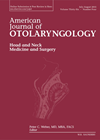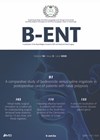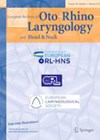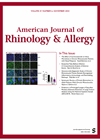
Journal Reviews
Early DCR may be better than delayed in acute dacrocystitis?
Traditionally, acute dacrocystitis has been treated conservatively with antibiotics, analgesia and warm compresses, with surgery reserved for later when the infection has subsided. This meta-analysis looks at early vs. late endonasal dacrocystorhinostomy (DCR) in the treatment of acute dacrocystitis, looking...
Nasal allergies and OSA
The first day of June is the meteorological start of summer. As a moderately wet spring slowly blurs to (a damp UK) summer, we can look forward to holidays in the countryside, enjoying the changing pollen seasons from tree to...
Rosemary oil to aid surgical healing?
There are a multitude of ways in which to damage the nasal epithelium, whether iatrogenically through nasal surgery, via injury, allergy, infection or inhalation of an environmental pollutant. This study looks at the role of the herb rosemary, in the...
Neonatal nasal stenosis - conservative approach
The authors retrospectively evaluated the efficacy of heated humidified high-flow nasal cannula (HFNC) in neonates with nasal stenosis for this study. Of the six infants included in the study, five had congenital pyriform aperture stenosis. Three of these five also...
A comparison between biologic and surgical treatment (FESS) for chronic rhinosinusitis with polyposis
In recent years, it is being increasingly recognised that chronic rhinosinusitis with nasal polyps (CRSwP) is a type 2 chronic inflammation based on IL-4 and IL-13, and the novel monoclonal antibody, such as dupilumab, is likely to have a major...
An effective treatment for post Covid-19 smell loss?
It is well understood that calcium levels in the nasal mucous affect the ability to smell, with higher levels having a negative impact, and some studies have shown increased calcium levels in patients suffering with Covid-19-related olfactory dysfunction. Calcium chelating...
Chronic rhinosinusitis – a pre-malignant condition?
Nasopharyngeal carcinoma (NPC) is a relatively uncommon diagnosis in the West but is prevalent in Southeast Asia. Several factors have been established to be associated with a higher risk of developing NPC, including salted fish consumption, smoking, alcohol, and Epstein...
Long-term results for dupilumab are very promising!
Eosinophilic chronic rhinosinusitis (eCRS) is complicated by frequent early and aggressive recurrence of polyps after both medical and surgical treatment regimes. Dupilumab is an anti-IL-4/IL-3 receptor monoclonal antibody and has been previously studied in the SINUS-52 study, with an observation...
Is GERD linked to CRS?
We are all well aware that both chronic rhinosinusitis and reflux are prevalent in our populations. This meta-analysis looked at 25 studies investigating the association between GERD, LPR and CRS, therefore evaluating more than 117,000 patients. The results are fascinating...
Septal perforation healing
This Turkish animal-based study looked at the healing properties of Hypericum Oleum (HO, or St John’s wort) and Triticum vulgare (TV, or wheat germ oil) on nasal septal perforations in rats. Both HO and TV have wound healing properties and...
ChatGPT to select patients for biologic therapies in CRSwNP?
This short communication describes programming the artificial intelligence (AI) algorithm for systematic review of current literature about guidelines on the clinical efficacy and safety of biologics in the treatment of chronic rhinosinusitis with nasal polyps (CRSwNP). The authors first performed...
Balloon dilatation of the eustachian tube - largely very safe but not entirely without risk
Consent is a fundamental part of our daily working lives. This is something as simple as consent to examine a patient, consent to undertake a procedure as minor as taking blood, through to consent for a major operation. Whatever the...














